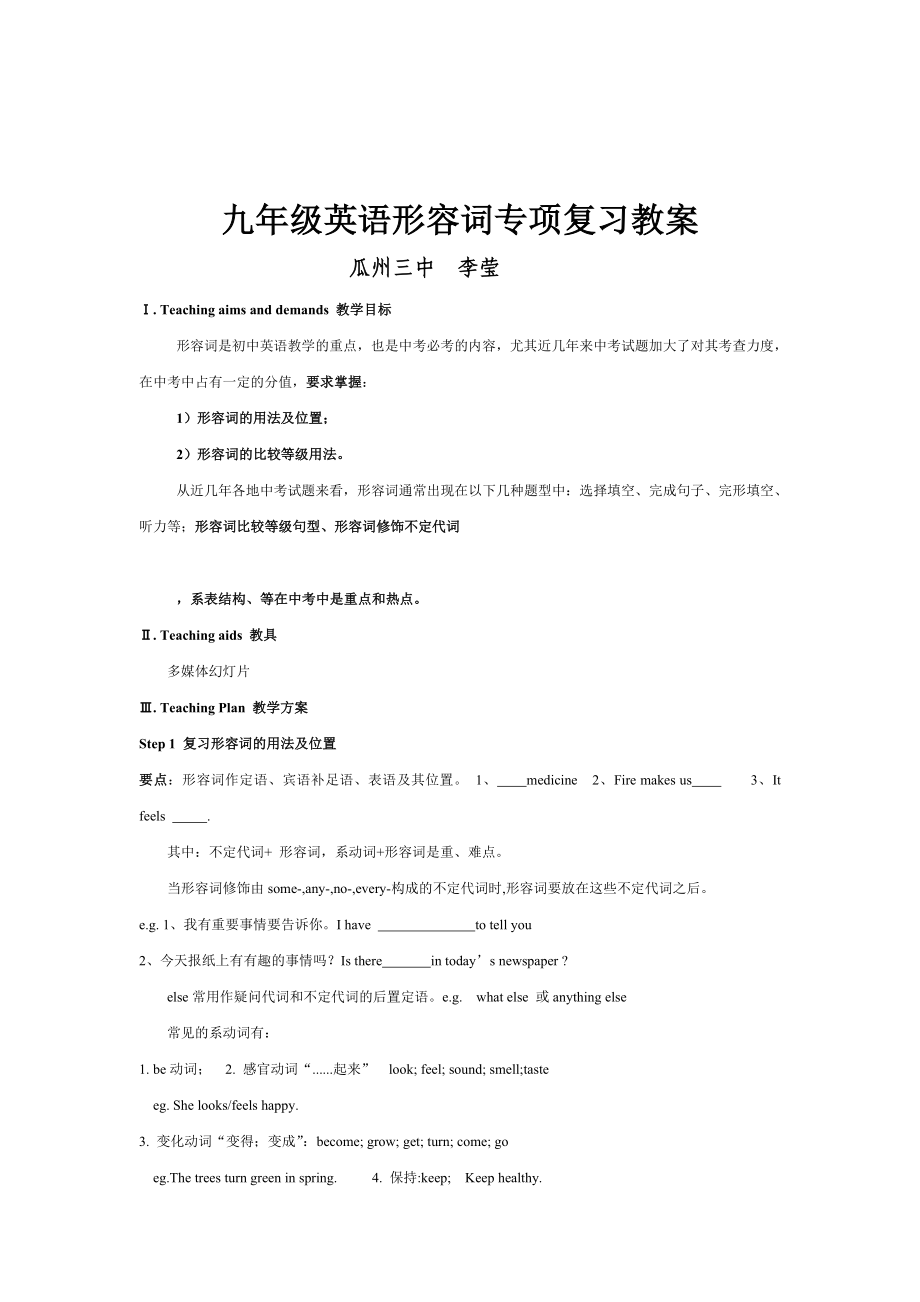《九年級(jí)英語(yǔ)形容詞專項(xiàng)復(fù)習(xí)教案.doc》由會(huì)員分享�����,可在線閱讀����,更多相關(guān)《九年級(jí)英語(yǔ)形容詞專項(xiàng)復(fù)習(xí)教案.doc(4頁(yè)珍藏版)》請(qǐng)?jiān)谘b配圖網(wǎng)上搜索。
1�����、九年級(jí)英語(yǔ)形容詞專項(xiàng)復(fù)習(xí)教案 瓜州三中 李瑩. Teaching aims and demands 教學(xué)目標(biāo)形容詞是初中英語(yǔ)教學(xué)的重點(diǎn)���,也是中考必考的內(nèi)容����,尤其近幾年來(lái)中考試題加大了對(duì)其考查力度,在中考中占有一定的分值����,要求掌握:1)形容詞的用法及位置;2)形容詞的比較等級(jí)用法。從近幾年各地中考試題來(lái)看����,形容詞通常出現(xiàn)在以下幾種題型中:選擇填空、完成句子���、完形填空、聽力等�����;形容詞比較等級(jí)句型���、形容詞修飾不定代詞����,系表結(jié)構(gòu)、等在中考中是重點(diǎn)和熱點(diǎn)。. Teaching aids 教具 多媒體幻燈片. Teaching Plan 教學(xué)方案Step 1 復(fù)習(xí)形容詞的用法及位置要點(diǎn):形容詞作定語(yǔ)�����、賓語(yǔ)
2���、補(bǔ)足語(yǔ)��、表語(yǔ)及其位置���。 1�����、 medicine 2�����、Fire makes us 3、It feels . 其中:不定代詞+ 形容詞���,系動(dòng)詞+形容詞是重、難點(diǎn)�����。 當(dāng)形容詞修飾由some-,any-,no-,every-構(gòu)成的不定代詞時(shí),形容詞要放在這些不定代詞之后���。e.g. 1����、我有重要事情要告訴你��。I have to tell you2���、今天報(bào)紙上有有趣的事情嗎?Is there in todays newspaper ? else常用作疑問代詞和不定代詞的后置定語(yǔ)���。e.g. what else 或anything else 常見的系動(dòng)詞有:1. be動(dòng)詞���; 2. 感官動(dòng)詞“.起來(lái)” look
3、; feel; sound; smell;taste eg. She looks/feels happy. 3. 變化動(dòng)詞“變得�����;變成”:become; grow; get; turn; come; go eg.The trees turn green in spring. 4. 保持:keep; Keep healthy. 復(fù)合形容詞的構(gòu)成:kind-hearted 好心的 �����; good-looking 好看的��;hard-working 勤勞的 ��;a boy 一個(gè)四歲的男孩方法:通過(guò)幻燈圖片引入形容詞的用法及位置比較直觀���,避免純語(yǔ)法講解的抽象性��。Step 2復(fù)習(xí)形容詞比較級(jí)和最高級(jí)的規(guī)則與不
4��、規(guī)則變化要點(diǎn):形容詞比較級(jí)和最高級(jí)的規(guī)則變化有四條���,不規(guī)則變化有g(shù)ood/well���;bad/ /ill�����;many/much;little/far/old��。方法:通過(guò)看圖并理解引入大多數(shù)形容詞有三個(gè)等級(jí)���,然后通過(guò)填表形式引出形容詞比較級(jí)和最高級(jí)的規(guī)則與不規(guī)則變化��。Step 3 復(fù)習(xí)形容詞比較等級(jí)的用法要點(diǎn):一���、原級(jí)用法: as+形容詞原形+as和not as/so+形容詞原形+as Tom is as tall as Mike. 二�����、比較級(jí)用法: (一)比較級(jí)基本用法:1����、 A + 動(dòng)詞 +比較級(jí) + than + B Our school is larger than theirs.The f
5��、ox is running faster than the duck.2����、 表示兩者之間的選擇:Which(Who) is+比較級(jí)��,A or B ? Which (Who) like better, A or B? 3����、 越來(lái)越 :比較級(jí) + and + 比較級(jí) (warmer and warmer)more and more + 原級(jí) (more and more beautiful)強(qiáng)調(diào)比較級(jí)前可用much, even, a lot, a little等詞修飾表示程度�����。 (二)比較級(jí)特殊用法:1��、越越 the +比較級(jí) , the + 比較級(jí): 我們吃得越有規(guī)律我們就越健康�����。 The mo
6、re regularly we eat, the healthier we are.2��、the + 比較級(jí) + of + the two “兩個(gè)中比較的” 他是這兩個(gè)人中較高的(那個(gè))���。 He is the taller of the two.3�����、前者不如后者:“l(fā)ess + 原級(jí) + than ” (not + as/ so +as ) 這篇文章比那篇容易:This article is less difficult than that one. 三、最高級(jí)用法: 1���、A + 動(dòng)詞 +(the)+最高級(jí) +比較范圍 (of / in 短語(yǔ)) “of + 復(fù)數(shù)”表示“在之中的”���; in后接表單
7��、位�����、組織�����、時(shí)間等單數(shù)名詞(或代詞)��。 He is the tallest in his class/of the three.2�����、Which (Who) is the+ 最高級(jí), A, B or C? Which (Who) like best, A, B or C? 3�����、one of the + 形容詞的最高級(jí) + 復(fù)數(shù)名詞,表示“是最之一者” The Great Wall is one of the greatest wonders of the world. 4、 the + 序數(shù)詞 +形容詞的最高級(jí) + 名詞the second longest river.(第二最長(zhǎng)的河流 )方法:通
8����、過(guò)例子的呈現(xiàn)來(lái)啟發(fā)學(xué)生歸納句型結(jié)構(gòu)���,并盡量結(jié)合情景來(lái)練習(xí)句型�����。Step 4 實(shí)戰(zhàn)演練選擇填空1.-How do you think of the English song Yesterday Once More. -It sounds _. A.well B.sadly C.beautiful 2.-Is the math problem _? -Yes. I can work it out _. A.easy; easily B.easy; easy C.easily; easy 3.-Mike, I dont like this; its too noisy here. -Well, le
9�����、ts go_ . A.something quiet B.quiet something C.anything quiet4.Dont worry about your son . He is _ to look after himself. A.enough old B.too old C.old enough 5. - _ do you go to the evening school? -Twice a week. A.How long B.How often C. How much6.We shouldnt spend _ time on the Internet. A.too muc
10����、h B.too many C.much too7.English is as_as Chinese.You should learn it well.A.much more important B.important C.the most important 8.-Who is _ , Yao Ming, Liu Xiang or Michael Jordan ? -Yao Ming, of course. A.tall B. taller C. the tallest 9. - Its very_ today. -Yes, and it will be much _ tomorrow. A.hotter ; hot B.hot ; hoter C.hot; hotter10. -What do you think of Beijing?-It is becoming _. . A.beautiful and beautiful B.more and more beautiful C.beautifuler and beautifuler Step 5 小結(jié)本節(jié)課主要內(nèi)容�����。Step 6 布置作業(yè):練習(xí)冊(cè)第一題�����。
 九年級(jí)英語(yǔ)形容詞專項(xiàng)復(fù)習(xí)教案.doc
九年級(jí)英語(yǔ)形容詞專項(xiàng)復(fù)習(xí)教案.doc

